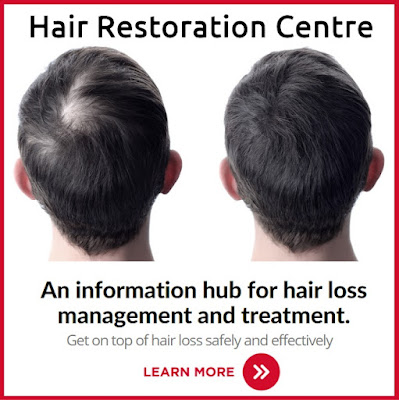The Best Male Hair Loss Treatment Options
Male pattern baldness, also known as androgenetic alopecia, is a common condition characterised by a receding hairline and thinning of hair on the crown of the head. It's the most common type of hair loss in men and is typically influenced by genetics and hormonal factors.
There is no cure for male pattern baldness, but there are some treatments that can help reduce the rate of hair fall, and promote the function of healthy hair growth. When it comes to treating hair loss, the earlier you act, the more hair you'll keep.
Minoxidil
Minoxidil is another FDA-approved medication for the treatment of male pattern baldness. Unlike finasteride, which works by blocking the conversion of testosterone to dihydrotestosterone (DHT), minoxidil works differently. It's a topical solution that is applied directly to the scalp, and its exact mechanism of action is not fully understood. However, it is believed to promote hair growth by increasing blood flow to the scalp and stimulating hair follicles.
Minoxidil has been shown to be effective in promoting hair growth and slowing down hair loss in men with male pattern baldness. It is particularly useful for stimulating hair regrowth in areas where the hair has become thin or has started to recede.
Minoxidil is available in various formulations, including solutions and foams, and is typically applied directly to the scalp twice daily. It's important to follow the instructions provided by the manufacturer or healthcare provider for proper application and dosage.
Like finasteride, minoxidil requires continuous use to maintain any hair regrowth achieved. It may take several months of regular use before results become noticeable, and stopping treatment can lead to a return of hair loss.
Minoxidil is generally well-tolerated when used as directed, but some individuals may experience side effects. Common side effects may include scalp irritation, itching, and dryness. In rare cases, minoxidil may cause more severe side effects such as unwanted facial hair growth or rapid heartbeat. If you experience any concerning side effects, it's essential to discontinue use and consult with a healthcare provider.
Overall, minoxidil is a widely used and effective treatment option for male pattern baldness, particularly for individuals who prefer a topical solution or cannot tolerate the side effects of oral medications like finasteride. As with any medication, it's important to use minoxidil as directed and consult with a healthcare provider if you have any questions or concerns.
Ketoconazole is an antifungal medication that has also been found to have potential benefits for treating male pattern baldness. While its primary use is in treating fungal infections of the skin, scalp, and nails, ketoconazole has been investigated for its secondary effects on hair growth.
Ketoconazole has anti-inflammatory properties that may help reduce scalp inflammation, which is believed to play a role in male pattern baldness. Additionally, it has antifungal properties that can help combat scalp conditions such as dandruff, which may contribute to hair loss.
Ketoconazole is available in topical formulations, including shampoos (Nizoral) and creams, that can be applied directly to the scalp. Ketoconazole shampoo is commonly used to treat dandruff and seborrheic dermatitis, but some studies suggest that it may also help promote hair growth and reduce hair loss in individuals with male pattern baldness.
While some studies have suggested that ketoconazole may have potential benefits for hair growth in individuals with male pattern baldness, the evidence is limited and further research is needed to confirm its efficacy.
HR23+ is a specialist hair supplement marketed as a solution for promoting hair growth and reducing hair loss. It contains a combination of vitamins, minerals, and potent herbal extracts that are purported to support hair health and stimulate hair growth.
HR23+ typically contains a variety of ingredients that are believed to support hair health and growth. These include vitamins such as biotin (B7), vitamin E, and vitamin D, minerals such as zinc and iron, as well as herbal extracts like saw palmetto, stinging nettle, and horsetail extract. These ingredients are often chosen for their potential roles in hair growth and maintenance.
The ingredients in HR23+ are purported to work through various mechanisms to support hair growth. For example, B7 is believed to play a role in the production of keratin, a protein that forms the structure of hair. Saw palmetto is thought to inhibit the enzyme 5-alpha reductase, which converts testosterone into dihydrotestosterone (DHT), a hormone implicated in male pattern baldness.
Dietary supplements like HR23+ are not regulated as strictly as pharmaceutical drugs, which means their safety and efficacy may not be as well-established. While many of the ingredients in HR23+ are generally considered safe when taken as directed, there is a risk of side effects or interactions with other medications. It's important to consult with a healthcare provider before starting any new supplement, especially if you have underlying health conditions or are taking medications.
Some individuals may choose to use HR23+ or similar supplements as part of a comprehensive approach to promoting hair health, along with other treatments such as minoxidil. Many men take HR23+ as a safe alternative to harsh medications like finasteride.
Effective treatments for male pattern baldness are limited, but here are five treatments (non-surgical) that can help stop hair loss, and help retain the hair you have, over a long period of time.
Finasteride/Dutasteride
Finasteride is an FDA-approved medication for the treatment of male pattern baldness. It works by inhibiting the enzyme 5-alpha reductase, which converts testosterone into dihydrotestosterone (DHT). DHT is a hormone that contributes to hair loss by shrinking hair follicles over time.
Clinical studies have shown that finasteride is effective in slowing down hair loss and promoting hair regrowth in men with male pattern baldness. It can help to maintain existing hair and potentially regrow hair in some areas of the scalp.
Finasteride is typically taken orally in the form of a pill, usually once a day. It's important to note that results may take several months to become noticeable, and continuous treatment is necessary to maintain any significant results.
While finasteride is generally well-tolerated, it can cause side effects in some individuals. The most common side effects include decreased libido, erectile dysfunction, and decreased ejaculate volume. These side effects are usually reversible upon discontinuation of the medication, but it's essential to discuss any concerns with a healthcare provider.
There has been some debate and controversy surrounding the safety of finasteride, particularly regarding its potential long-term effects on sexual function and mental health, therefore caution is strongly advised.
Before starting finasteride or any other medication for male pattern baldness, it's important to consult with a healthcare provider, such as a dermatologist or primary care physician. They can assess your individual case, discuss potential risks and benefits, and help you make an informed decision about treatment.
Finasteride is an FDA-approved medication for the treatment of male pattern baldness. It works by inhibiting the enzyme 5-alpha reductase, which converts testosterone into dihydrotestosterone (DHT). DHT is a hormone that contributes to hair loss by shrinking hair follicles over time.
Clinical studies have shown that finasteride is effective in slowing down hair loss and promoting hair regrowth in men with male pattern baldness. It can help to maintain existing hair and potentially regrow hair in some areas of the scalp.
Finasteride is typically taken orally in the form of a pill, usually once a day. It's important to note that results may take several months to become noticeable, and continuous treatment is necessary to maintain any significant results.
While finasteride is generally well-tolerated, it can cause side effects in some individuals. The most common side effects include decreased libido, erectile dysfunction, and decreased ejaculate volume. These side effects are usually reversible upon discontinuation of the medication, but it's essential to discuss any concerns with a healthcare provider.
There has been some debate and controversy surrounding the safety of finasteride, particularly regarding its potential long-term effects on sexual function and mental health, therefore caution is strongly advised.
Before starting finasteride or any other medication for male pattern baldness, it's important to consult with a healthcare provider, such as a dermatologist or primary care physician. They can assess your individual case, discuss potential risks and benefits, and help you make an informed decision about treatment.
Ad.
Minoxidil
Minoxidil is another FDA-approved medication for the treatment of male pattern baldness. Unlike finasteride, which works by blocking the conversion of testosterone to dihydrotestosterone (DHT), minoxidil works differently. It's a topical solution that is applied directly to the scalp, and its exact mechanism of action is not fully understood. However, it is believed to promote hair growth by increasing blood flow to the scalp and stimulating hair follicles.
Minoxidil has been shown to be effective in promoting hair growth and slowing down hair loss in men with male pattern baldness. It is particularly useful for stimulating hair regrowth in areas where the hair has become thin or has started to recede.
Minoxidil is available in various formulations, including solutions and foams, and is typically applied directly to the scalp twice daily. It's important to follow the instructions provided by the manufacturer or healthcare provider for proper application and dosage.
Like finasteride, minoxidil requires continuous use to maintain any hair regrowth achieved. It may take several months of regular use before results become noticeable, and stopping treatment can lead to a return of hair loss.
Minoxidil is generally well-tolerated when used as directed, but some individuals may experience side effects. Common side effects may include scalp irritation, itching, and dryness. In rare cases, minoxidil may cause more severe side effects such as unwanted facial hair growth or rapid heartbeat. If you experience any concerning side effects, it's essential to discontinue use and consult with a healthcare provider.
Overall, minoxidil is a widely used and effective treatment option for male pattern baldness, particularly for individuals who prefer a topical solution or cannot tolerate the side effects of oral medications like finasteride. As with any medication, it's important to use minoxidil as directed and consult with a healthcare provider if you have any questions or concerns.
Ketoconazole
Ketoconazole is an antifungal medication that has also been found to have potential benefits for treating male pattern baldness. While its primary use is in treating fungal infections of the skin, scalp, and nails, ketoconazole has been investigated for its secondary effects on hair growth.
Ketoconazole has anti-inflammatory properties that may help reduce scalp inflammation, which is believed to play a role in male pattern baldness. Additionally, it has antifungal properties that can help combat scalp conditions such as dandruff, which may contribute to hair loss.
Ketoconazole is available in topical formulations, including shampoos (Nizoral) and creams, that can be applied directly to the scalp. Ketoconazole shampoo is commonly used to treat dandruff and seborrheic dermatitis, but some studies suggest that it may also help promote hair growth and reduce hair loss in individuals with male pattern baldness.
While some studies have suggested that ketoconazole may have potential benefits for hair growth in individuals with male pattern baldness, the evidence is limited and further research is needed to confirm its efficacy.
Ketoconazole shampoos are typically used a few times per week, but frequency may vary depending on the specific product and individual needs. It's also essential to be aware of any potential side effects or interactions with other medications.
Overall, while ketoconazole may have potential benefits for treating male pattern baldness, it's not considered a primary treatment option, and more research is needed to fully understand its effects on hair growth. As always, it's important to consult with a healthcare provider before starting any new treatment for hair loss.
Overall, while ketoconazole may have potential benefits for treating male pattern baldness, it's not considered a primary treatment option, and more research is needed to fully understand its effects on hair growth. As always, it's important to consult with a healthcare provider before starting any new treatment for hair loss.
Ad.
Keratinocyte Growth Factor (KGF)
Keratinocyte growth factor (KGF), also known as fibroblast growth factor 7 (FGF7), is a protein that plays a role in the growth and maintenance of epithelial tissues, including the skin and hair follicles. While KGF has been investigated for its potential therapeutic effects on hair growth, particularly in the context of male pattern baldness, research in this area is still in the early stages, and its effectiveness for treating hair loss is not yet well-established.
KGF is involved in the regulation of cell proliferation, differentiation, and survival in epithelial tissues. In the context of hair follicles, KGF is thought to stimulate the growth and differentiation of keratinocytes, the main cells that make up the outer layer of the skin and hair.
Preclinical studies and early clinical trials have shown that KGF may have potential benefits for promoting hair growth and reducing hair loss in individuals with male pattern baldness. KGF may work by stimulating the proliferation of hair follicle stem cells and promoting the growth of new hair shafts.
KGF is typically administered through topical application directly to the scalp or as an injectable formulation. The exact method of administration and dosage may vary depending on the specific formulation and protocol used in clinical studies.
While early studies have shown promising results, the clinical evidence supporting the effectiveness of KGF for treating male pattern baldness is still limited. Larger, well-controlled clinical trials are needed to further evaluate its safety and efficacy in a broader population of individuals with hair loss.
As with any therapeutic agent, there may be potential side effects associated with the use of KGF, although the specific side effect profile is not well-established. Common side effects may include scalp irritation, redness, or itching at the site of application.
In summary, while KGF shows promise as a potential treatment for male pattern baldness based on preclinical and early clinical studies, more research is needed to establish its safety and efficacy in larger clinical trials. It's important to consult with a healthcare provider before considering any experimental or investigational treatments for hair loss.
HR23+ Specialist Hair Supplement
Keratinocyte growth factor (KGF), also known as fibroblast growth factor 7 (FGF7), is a protein that plays a role in the growth and maintenance of epithelial tissues, including the skin and hair follicles. While KGF has been investigated for its potential therapeutic effects on hair growth, particularly in the context of male pattern baldness, research in this area is still in the early stages, and its effectiveness for treating hair loss is not yet well-established.
KGF is involved in the regulation of cell proliferation, differentiation, and survival in epithelial tissues. In the context of hair follicles, KGF is thought to stimulate the growth and differentiation of keratinocytes, the main cells that make up the outer layer of the skin and hair.
Preclinical studies and early clinical trials have shown that KGF may have potential benefits for promoting hair growth and reducing hair loss in individuals with male pattern baldness. KGF may work by stimulating the proliferation of hair follicle stem cells and promoting the growth of new hair shafts.
KGF is typically administered through topical application directly to the scalp or as an injectable formulation. The exact method of administration and dosage may vary depending on the specific formulation and protocol used in clinical studies.
While early studies have shown promising results, the clinical evidence supporting the effectiveness of KGF for treating male pattern baldness is still limited. Larger, well-controlled clinical trials are needed to further evaluate its safety and efficacy in a broader population of individuals with hair loss.
As with any therapeutic agent, there may be potential side effects associated with the use of KGF, although the specific side effect profile is not well-established. Common side effects may include scalp irritation, redness, or itching at the site of application.
In summary, while KGF shows promise as a potential treatment for male pattern baldness based on preclinical and early clinical studies, more research is needed to establish its safety and efficacy in larger clinical trials. It's important to consult with a healthcare provider before considering any experimental or investigational treatments for hair loss.
HR23+ Specialist Hair Supplement
HR23+ is a specialist hair supplement marketed as a solution for promoting hair growth and reducing hair loss. It contains a combination of vitamins, minerals, and potent herbal extracts that are purported to support hair health and stimulate hair growth.
HR23+ typically contains a variety of ingredients that are believed to support hair health and growth. These include vitamins such as biotin (B7), vitamin E, and vitamin D, minerals such as zinc and iron, as well as herbal extracts like saw palmetto, stinging nettle, and horsetail extract. These ingredients are often chosen for their potential roles in hair growth and maintenance.
The ingredients in HR23+ are purported to work through various mechanisms to support hair growth. For example, B7 is believed to play a role in the production of keratin, a protein that forms the structure of hair. Saw palmetto is thought to inhibit the enzyme 5-alpha reductase, which converts testosterone into dihydrotestosterone (DHT), a hormone implicated in male pattern baldness.
Dietary supplements like HR23+ are not regulated as strictly as pharmaceutical drugs, which means their safety and efficacy may not be as well-established. While many of the ingredients in HR23+ are generally considered safe when taken as directed, there is a risk of side effects or interactions with other medications. It's important to consult with a healthcare provider before starting any new supplement, especially if you have underlying health conditions or are taking medications.
Some individuals may choose to use HR23+ or similar supplements as part of a comprehensive approach to promoting hair health, along with other treatments such as minoxidil. Many men take HR23+ as a safe alternative to harsh medications like finasteride.



















0 comments:
Post a Comment